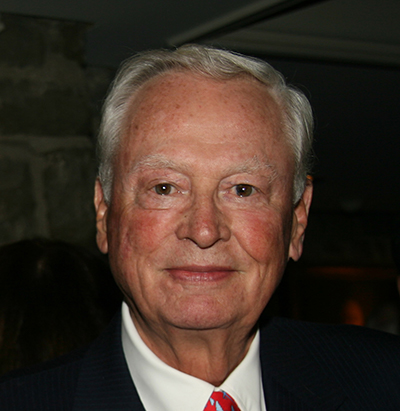
Chairman Emeritus

Retired chairman, president, and chief executive officer of Hilton Hotels Corporation, Barron Hilton joined the Foundation bearing his father’s name in 1950 and served as board chair from 2007 to 2012. He stepped down from the Board in 2014, after 64 years of distinguished service. Following his father’s example, he has committed the bulk of his personal fortune to the Foundation. This gift, which surpasses the amount bequeathed by our founder, will make Barron Hilton the Foundation’s most significant donor.
Barron Hilton volunteered for the U.S. Navy during World War II and was assigned to the base at Pearl Harbor as a photographer’s mate. After his discharge, he earned a twin-engine rating from the University of Southern California’s Aeronautical School, and flying soon became a lifelong passion. Hilton began his business career at age 19 by acquiring the Los Angeles area distributorship of Vita-Pakt Citrus Products Co., and in 1956 he helped pioneer the aircraft leasing business by founding the Air Finance Corporation.
In 1960, he founded the Los Angeles Chargers professional football team and one year later moved the franchise to San Diego. In 1966, Hilton, together with other American Football League owners, forged a merger agreement with the National Football League that resulted in the creation of the Super Bowl.
Hilton began his career as a hotelier while still a teenager, working as a doorman and in the engineering department at the El Paso Hilton. In 1954 he was elected vice-president of Hilton Hotels and he was named president and chief executive officer in 1966, with the proviso that he discontinue his professional football responsibilities. Upon his father’s death in 1979, his responsibilities expanded to include chairman. He served as chairman and/or co-chairman from 1996 until the company’s sale and dissolution as a public company in 2007. As president, he was instrumental in expanding the company’s role in several areas including originating the universal Carte Blanche credit card system and developing the Hilton Inns franchise program, an influential prototype in today’s hospitality industry. He led the way when Hilton Hotels Corporation became the first New York Stock Exchange company to enter the casino gaming industry in 1971.
In 1998, Pope John Paul II granted Barron Hilton admission into the Pontifical Order of Saint Gregory the Great, in acknowledgement of his meritorious service to the Church. He has an honorary Doctor of Humane Letters degree from the University of Houston, where he has also been inducted into the Hospitality Industry Hall of Honor. Hilton has been honored with Lifetime Achievement Awards from the Beverly Hills Chamber of Commerce and the gaming industry. He also received an honorary Doctor of Laws degree from Loyola Marymount University. In recognition of his involvement in aviation, he has been awarded the prestigious Gold Air Medal by the Federation Aeronatique Internationale, and the Pioneers of Flight Gallery at the Smithsonian National Air and Space Museum has been named in his honor. He previously served on the boards of numerous nonprofit organizations and is a director emeritus of the BEST Foundation.